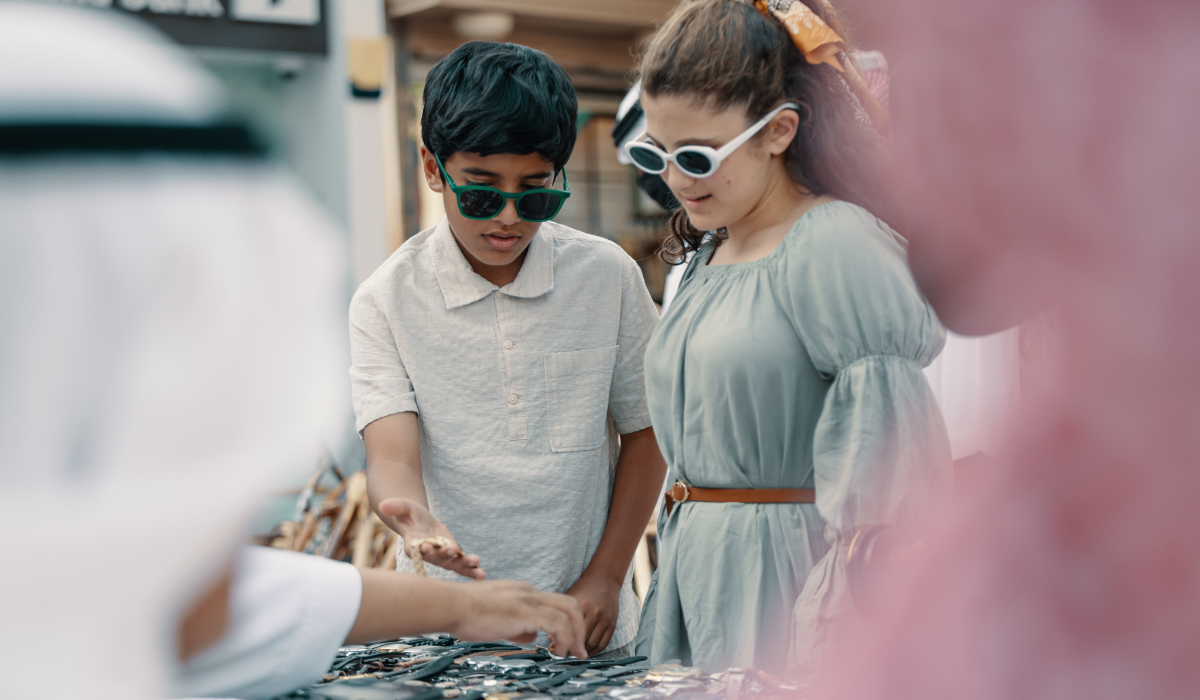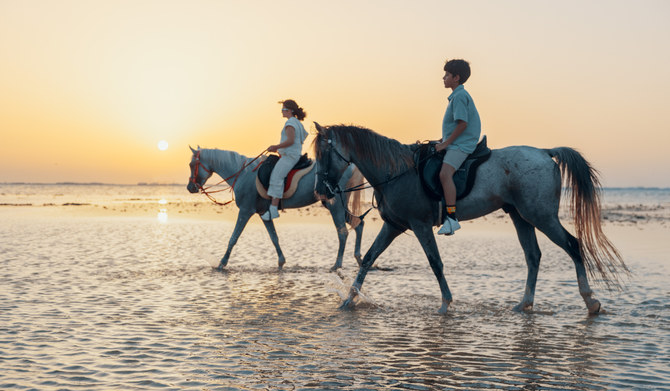JEDDAH: In a heartwarming tale of friendship and cultural exploration, 14-year-old Omar from Jeddah took it upon himself to be the guide for 12-year-old Australian Aya during a two-week adventure through Saudi Arabia.
From the bustling cities of Riyadh and Jeddah to the scenic landscapes of Taif, Baha and Asir, Omar and Aya embarked on a journey that not only showcased the beauty of the country but also highlighted the hospitality deeply ingrained in the Saudi DNA.

Omar and Aya’s journey through Saudi Arabia is a testament to the power of friendship, cultural exchange and the hospitality that the Kingdom offers. (Supplied)
Their journey was captured in a series of videos published by Saudi Tourism Authority’s Visit Saudi website, documenting their experiences and capturing the essence of the Kingdom. As they navigated their way through historical sites, natural wonders and vibrant markets, the friends discovered the true essence of Saudi culture and formed lasting memories.
One of the videos captures Aya’s awe as she says: “I can see why you would be so proud of your country, and you should be.” This sentiment was echoed throughout their journey, as Aya and Omar encountered the warmth and kindness of the Saudi people.
HIGHLIGHTS
• Omar and Australian visitor Aya’s journey was captured in a series of videos published by Saudi Tourism Authority’s Visit Saudi website.
• In Baha they were guided by Abu Fahd, an experienced local.
• Dr. Saleh Al-Ghamdi, an eye surgeon, took them on a tour of his olive farm.
• The Red Sea, with its mesmerizing shades of blue, reminded Aya of Australia’s Great Barrier Reef.
During their visit to Diriyah, Aya expressed her admiration for Omar’s connection to his heritage: “It’s really beautiful how you care about your heritage.” The duo continued their exploration, visiting the bustling Souq Al-Zal, where they interacted with local merchants. Aya said to one of the merchants: “I thank you for what you are doing, showcasing the Saudi culture.”
Their adventure took them to Jeddah’s historic district, Al-Balad, where Omar expressed his joy in sharing the experience with Aya: “I’m really happy that you’re here with me, discovering it (Al-Balad).” The friends also ventured to Baha, where they were guided by Abu Fahd, an experienced local. It was an exciting experience for Omar as well, as it was his first time visiting Baha.

Omar and Aya’s journey through Saudi Arabia is a testament to the power of friendship, cultural exchange and the hospitality that the Kingdom offers. (Supplied)
Aya’s favorite memory was their visit to the waterfalls, surrounded by lush greenery and mesmerizing natural beauty. She also cherished the opportunity to explore a traditional village, where she learned about the rich history and customs of Saudi Arabia.
Reflecting on his motivation to showcase his country, Omar told Arab News: “I really love my country and I really want to show people my country and show them our special culture.”

Omar and Aya’s journey through Saudi Arabia is a testament to the power of friendship, cultural exchange and the hospitality that the Kingdom offers. (Supplied)
His passion resonated with both Saudis and international viewers, inspiring him to create more videos and share the beauty of the Kingdom.
Aya, too, had her perceptions of Saudi Arabia transformed by the journey: “My perspective on Saudi Arabia before I went there was that most of the country would be flat and made up of desert, so logically very hot. However, my opinion of Saudi Arabia completely changed when I arrived.”
Aya expressed her gratitude to Abu Fahd for showing them the incredible places in Baha and credited his kindness and hospitality for changing her initial perceptions.
I really love my country and I really want to show people my country and show them our special culture.
Omar, 14-year-old local
She also recounted their meeting with Fatma, a local Saudi woman who gifted them a traditional Saudi mask. Aya also cherished the opportunity to meet Dr. Saleh Al-Ghamdi, an eye surgeon with a passion for olive tree farming. He took them on a tour of his olive farm, leaving a lasting impression.
Aya’s favorite spots in Saudi Arabia included the traditional village, where she had the opportunity to learn about the country’s past practices and child protection methods, deepening her understanding of Saudi culture.
Another memorable location was the Red Sea, with its mesmerizing shades of blue that reminded her of Australia’s Great Barrier Reef. As a swimming enthusiast, this spot held a special place in her heart.
As their journey came to an end, Aya expressed her desire to return: “We had such a good time, hopefully I would like to come and visit again here.”
Omar and Aya’s journey through Saudi Arabia is a testament to the power of friendship, cultural exchange and the hospitality that the Kingdom offers. Their experiences serve as an inspiration for others to explore the untold stories and hidden gems of the country, bridging gaps and fostering understanding between cultures.




























